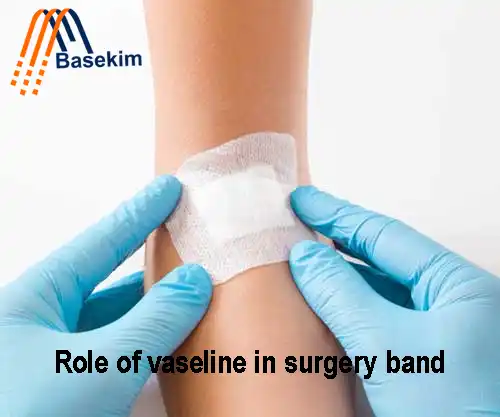
In medical care, small tools often make a big impact. Vaseline, also known as petroleum jelly, is one of those quiet helpers. Although simple, it supports faster healing, protects wounds, and lowers the risk of infection. Therefore, the Role of vaseline in surgery band is essential in surgeries, wound care, and clinical recovery.
In this guide, we’ll explore how vaseline works, why medical staff rely on it, and how Basekim supplies high-quality petroleum jelly used in hospitals worldwide.
What Is Vaseline and Why Is It Used in Surgery?
Vaseline is a thick, odorless substance made from refined petroleum. It is smooth, long-lasting, and forms a breathable barrier on the skin. For this reason, it is often used in ointments and wound dressings.
The Role of vaseline in surgery band is to create a moist environment that protects the wound and supports healing. Since it is non-irritating and non-allergenic, doctors use it safely on even the most sensitive areas.
Moreover, it does not interfere with medications or absorb into the body, making it ideal for post-operative dressings.
Key Benefits: Role of Vaseline in Surgery Band Explained
Let’s break down the main reasons vaseline is trusted in surgical dressings:
1. Prevents Sticking and Pain
When gauze sticks to wounds, removing it can tear new skin. However, a vaseline-coated bandage doesn’t stick. As a result, dressing changes become painless. Additionally, this reduces the chance of re-injury.
2. Speeds Up Healing
Vaseline locks in moisture. Because of that, the skin stays soft and regenerates more quickly. This moist environment prevents the wound from drying out and cracking.
3. Protects Against Bacteria
Dry wounds often crack, allowing germs to enter. But vaseline seals the surface and keeps bacteria out. Consequently, the Role of vaseline in surgery band is not only to protect, but also to reduce infection risks.
How Basekim Supports Surgical Healing with Petroleum Jelly
Basekim, a leading global supplier from Turkey and the UAE, provides medical-grade petroleum jelly (vaseline) for surgical and clinical applications. All Basekim products meet BP/USP safety standards and are used by manufacturers of wound dressings and surgical supplies.
Basekim’s Relevant Products Include:
White Petroleum Jelly (USP/BP Grade): For direct use in surgery bands and wound dressings
Soft Paraffin: Used in creams and topical products
Technical Petroleum Jelly: Suitable for non-clinical protective coatings
Therefore, choosing Basekim ensures high purity, safe ingredients, and consistency in every application.
How Medical Teams Apply Vaseline in Surgery Bands
The application process is simple yet highly effective:
First, clean the surgical area with a sterile solution.
Then, apply a thin layer of vaseline onto sterile gauze.
After that, place the gauze directly on the wound.
Finally, secure it with a secondary bandage.
This method ensures the wound remains moist and infection-free. Furthermore, it allows easier removal and a pain-free experience for the patient.
Where Is Vaseline Most Commonly Used?
The Role of vaseline in surgery band appears across many types of procedures, including:
Burn treatment
Skin graft recovery
Cesarean sections
Abdominal surgery
Orthopedic procedures
Minor skin injuries
In each of these situations, vaseline offers protection and comfort. Moreover, it works with all skin types, including sensitive or damaged skin.
Why Vaseline Is Preferred Over Other Ointments
Many ask: Why use vaseline instead of creams or gels?
First of all, vaseline contains no fragrances, dyes, or added chemicals. This means fewer allergic reactions. Also, it does not interfere with healing medications. In addition, it has a long shelf life and is easy to store.
Because of all this, doctors and nurses around the world trust the Role of vaseline in surgery band as a first-line wound care solution.
Storage and Handling Guidelines
To ensure safety and performance, follow these storage tips:
Always store in a cool, dry place
Seal the container after each use
Never touch the jelly with bare hands
Use sterile tools for application
By doing so, the vaseline remains clean and effective. Also, Basekim provides tamper-proof packaging options to maintain product quality during storage and transport.
Frequently Asked Questions (FAQ)
Q1: Why do doctors choose vaseline for surgery bands?
A: Because it prevents sticking, reduces pain, speeds up healing, and protects wounds from bacteria.
Q2: Is Basekim’s petroleum jelly safe for medical use?
A: Yes. Basekim supplies USP/BP-grade white petroleum jelly ideal for surgical and clinical applications.
Q3: Can I use regular store-bought vaseline after surgery?
A: It’s safer to use medical-grade vaseline from trusted suppliers like Basekim to avoid impurities.
Q4: How long does vaseline stay effective on a wound?
A: It typically lasts until the next dressing change—usually 24 to 48 hours—depending on wound type and location.
Q5: What is the shelf life of Basekim petroleum jelly?
A: Properly stored, it remains stable for 3 to 5 years.
Conclusion: Role of Vaseline in Surgery Band
To sum up, the Role of vaseline in surgery band is simple but powerful. It protects wounds, reduces pain, and supports healing without introducing harmful substances. From minor surgeries to major procedures, it delivers consistent results.
When you choose Basekim as your petroleum jelly supplier, you gain access to high-purity, medical-grade products trusted worldwide. With flexible packaging, fair pricing, and global delivery, Basekim ensures that every bandage does its job better.

